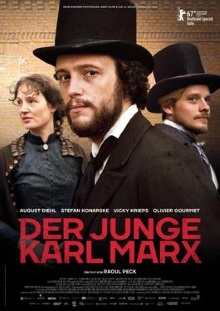
This film, made on the occasion of Karl Marx’s 200th birthday, caught my attention when it appeared on the festival circuit and so added it to my list. I only later noticed that it has a rather atrocious Rotten Tomatoes rating. Having watched it, I understand why but I don’t regret spending the time on it at all as I admire director Raoul Peck’s clear passion for the subject and for knowing exactly what he intended to achieve with this film.
The film opens with Marx as a journalist working for a newspaper that has just been shut down by the Prussian government. With the financial backing of the socialist Arnold Ruge, Marx and his wife Jenny moves to Paris to work for a new newspaper but still struggle to pay the bills. There, he meets the anarchist Pierre Proudhon. Meanwhile Friedrich Engels works for his father who owns factories in both England and Germany but is himself more interested in the plight of the working poor and becomes involved with Mary, a working class Irish woman. Marx and Engels meet in France and quickly becomes friends. Engels advises Marx to learn English and study the British economists. Eventually their collaboration would lead them to become at odds with other socialists who advocate peaceful means of advancing the interests of the poor. Realizing that in order to effect real change they need an organization behind them, they join the League of the Just, and soon take it over, turning it into the Communist League.
Most biographical films are hagiographic and offer plenty of flattering details of the subject’s life to evoke the audience’s sympathy and persuade you of his or her importance. Peck is clearly a fan but the film takes the unusual and courageous position that Marx’s place in history needs no justification and the rightness of his cause brooks no argument. It makes no real effort to persuade the audience that communism is a worthy cause and even assumes that anyone who watches this film has the requisite basic knowledge of who people like Proudhon, Wilhelm Weitling, Karl Grün etc. are. Instead the film is focused purely on Marx and Engels’ partnership and the political maneuvering they engaged in to get their ideas heard and seize control of a political organization and bend it to their own ends. Where most biographies end up being overly pedantic and simplistic, this film is the opposite and isn’t at all afraid that this greatly limits the audience it can reach. This alone is worthy of respect.
The film’s defiance of the need to cater to a more mainstream audience shows up in other areas as well. The production values and performances are all professional but more interesting is how French, German and English are all freely used depending on location and characters which adds a lot to verisimilitude. I especially liked how Engels and Marx playfully switch between German and French in their own private conversations, which serves to both show their familiarity with each other as well as their learnedness. Other scenes however do seem to have been included to address common criticisms against Marx. For example he is often seen gripping about needing to write articles for money to support his money and in one instance humbly goes to the post office to beg for a job. I did wish that the film covered more of their upbringing and their families. For example, they talks about how Jenny gave up an aristocratic life to marry Marx but never mention that they have been friends since childhood.
I’m obviously not a fan of Marxism and I know little about the man himself. Still he is an important historical figure and this film inspired me enough to read up a bit more of his biography. Its main failing is that it is tightly focused on a relatively short span of Marx’s life and doesn’t even try to win over those who aren’t already converts. Yet I love how original it is and how it accomplishes exactly what it sets out to do. This is no run of the mill biographical film and it doesn’t assume that the audience is stupid. Those are worth big points in its favor in my book.